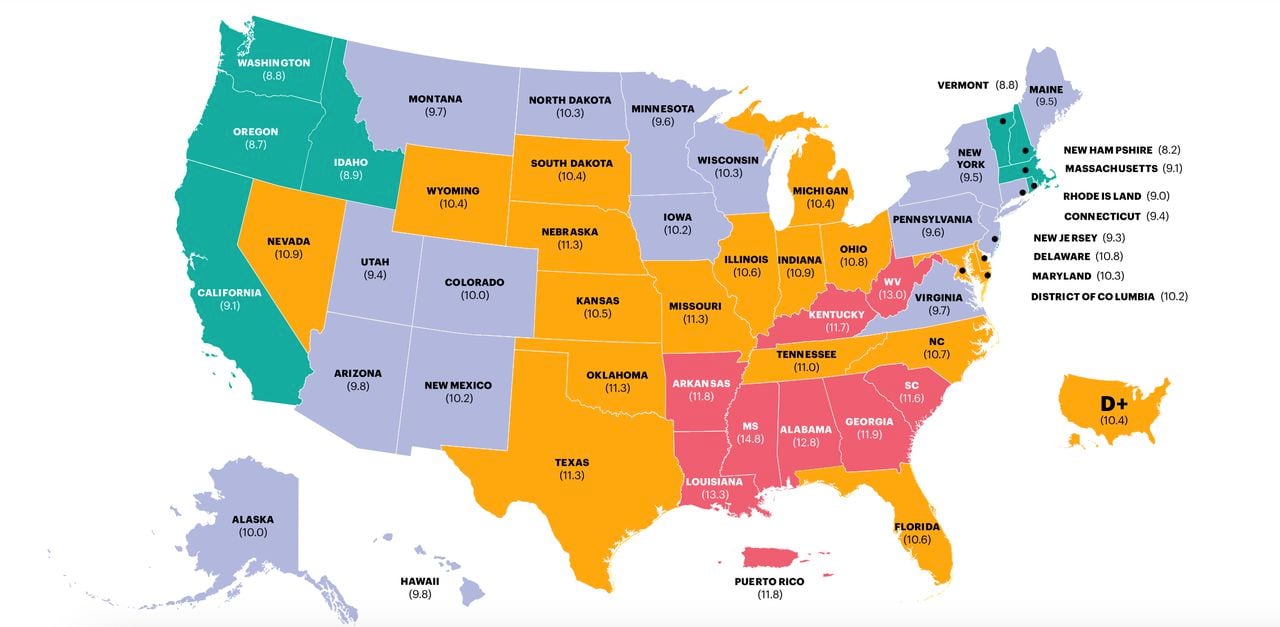Guest opinion: Alabama needs a wake up call with March of Dimes 2023 report card
This is a guest opinion colum
Imagine preparing to welcome home a new baby, only for your child to be born too sick and too soon. McKynlie Scott was born at 29 weeks, weighing just 1 lb. 14 oz., requiring her to stay in the neonatal intensive care unit (NICU) at Ascension St. Vincent’s Birmingham for 107 days. For over three months, McKynlie received special care that helped her build the critical strength she needed to go home with parents Melodie and Greg.
While McKynlie overcame major obstacles associated with preterm birth, including chronic lung disease, heart failure and liver and kidney issues, she still attends medical appointments and receives interventions at 8 years old. All of this support has helped her grow into a very fashionable, fabulous, and sassy girl. While the Scott’s story has a happy ending, the worry, sadness, and fear that impacts families like theirs facing a preterm birth can be devastating, and are sadly the reality for over 7,400 families in Alabama.
In Alabama stories like that are true for one in eight moms and their families. March of Dimes’ 2023 Report Card is a clear reminder that the state of maternal and infant health in the U.S., and, particularly in Alabama, is in crisis. The Report Card features key indicators across infant and maternal health, offering a full picture of the challenges we face today. The results are clear: As a nation we’re not doing enough to prioritize the well-being of moms and babies and, in Alabama, there’s even more work to be done.
Preterm birth is a leading cause of infant mortality in the U.S. and globally, and this year’s report reveals that preterm birth nationwide stands at 10.4%. While this marks a meager improvement from the historic high of 10.5%, this is not nearly enough to elevate the nation’s D+ grade, which we’ve held for the second consecutive year. In Alabama over 7,400 babies were born too soon, bringing our rate to 12.8%, just above the national rate. Some factors contributing to preterm birth in Alabama include hypertension at 29.2%, smoking at 16.1%, and diabetes at 37.3% of all preterm births.
The data looks beyond preterm birth to shed light on infant and maternal mortality rates and reveal inequities in our systems, policies, and environments that impact Black and American Indian/Alaskan Native (AI/AN) populations, who continue to carry a higher burden of these outcomes nationally. In Alabama the preterm birth rate among babies born to Black birthing people is 1.5X higher than the rate among all other babies.
Early data from the Centers of Disease Control and Prevention shows a 3% spike in infant mortality last year, the largest increase in more than 20 years. There has also been a drastic increase in maternal mortality rates, nearly doubling from 17.4 to 32.9 deaths per 100,000 live births. For both infant and maternal mortality, the rates are even more startling in communities of color.
The factors that influence outcomes for moms and babies are addressable, and many of them can be prevented through expanded access to care, managing chronic conditions, policy change, increased research, and more.
The time to act is now. Many of the factors that contribute to outcomes for moms and babies are central to all health and impact all of us. It’s up to us in Alabama to make a difference and ensure the best possible start for all families.
March of Dimes is leading the charge by advocating for policies like Medicaid extension, which Alabama has extended coverage for women to one year postpartum, as well as adopted the policy of Medicaid expansion, which allows birthing people greater access to preventative care during pregnancy. They’re also supporting research, innovation, and programs nationwide to improve maternal and infant health, including Mom & Baby Mobile Health Centers, funding Prematurity Research Centers, and the newly launched March of Dimes Health Equity Center.
In 2022, the Alabama Perinatal Quality Collaborative based out of the University of Alabama at Birmingham School of Public Health, was awarded federal funding to launch the Alabama Maternal Health Task Force. The role of the Task Force is to bring together partners and community members from across the state to address some of the greatest problems in Alabama’s maternity care systems. But the change we need won’t happen without everyone getting involved. Whether you’re a concerned citizen, a patient, a policymaker, or a healthcare provider, you can play a vital role in improving maternal and infant health. Visit marchofdimes.org/reportcard to learn more about how you can get involved.
In the end, the health of moms and babies is a collective responsibility, and together, we can make a significant impact on the state of maternal and infant health in Alabama and across the nation.
Dr. Tori Anderson, is a local pediatrician at Redmont Pediatrics and is chairwoman of March of Dimes’ Mission Impact Committee.
